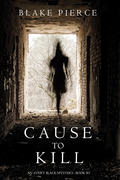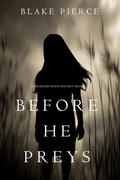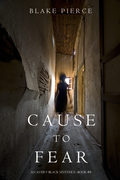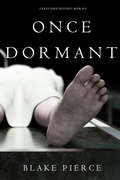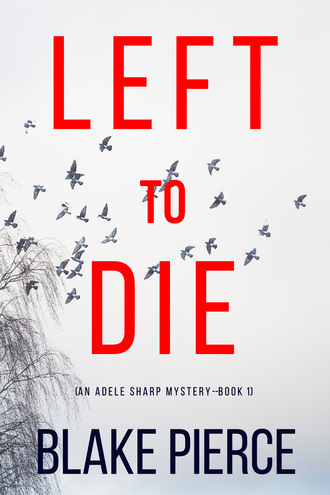
Блейк Пирс
Left To Die
CHAPTER EIGHTEEN
Her wheels jumped the curb, jolting Adele forward in her seat and causing her shoulder to slam into the edge of the steering wheel. She cursed, wishing she’d taken the time to buckle; but without correcting the parking, Adele flung open the borrowed car’s door and sprinted between the two gendarmerie vehicles flanking the entry of the park with flashing lights.
In the distance, she could see men milling about beneath the trees, guns saddled against their shoulders. The gendarmerie were technically a military branch, but they would often serve in keeping order among the citizenry.
Elsewhere, she spotted regular police officers searching through the park, flashlights at the ready, leashed hounds with black and brown fur leading the way.
The nighttime park, normally a quiet affair, echoed with barking, shouting, and urgent cries.
Adele frantically scanned the vehicles in front of the park, and she spotted the ambulance.
She sprinted toward the vehicle and managed to glimpse a limp foot on a stretcher just as the back door slammed shut with a metallic clang!
“I need to speak with him!” she shouted, hurrying over to the ambulance. She flashed her temporary DGSI credentials and brushed past one of the gendarmerie who reached out a hand to intercept her.
“Who’s in charge here?” Adele demanded, avoiding the insistent hand. “I need to speak with the victim!”
Before she could reach the ambulance, though, two police officers inserted themselves between her and the vehicle. One of them glared at her, his eyes stony beneath his blue and black hat. The other one held out both hands in a pleading gesture, and kept repeating, “You can’t; he’s unconscious. You can’t.”
Adele thought to push past the two of them, but then reconsidered and hesitated. “Are you in charge?” she asked, directing the question toward the scowling man.
He gave a brief shake of his head. “The captain is over there,” he said, curtly.
Adele glanced to where he was pointing, and spotted a group of officers milling around near a park bench upon which sat four kids. They couldn’t have much older than fourteen, and a couple of the smaller ones swung their legs over the edge of the bench. All of them shared the same nervous fidgeting gestures and sidelong glances.
“You’re sure he’s unconscious?” she demanded.
The pleading officer responded before the scowling one could reply. “He hasn’t been able to say a word. He responds to light, he’s alive, but we have to get to the hospital, now. We think he was drugged.”
Adele cursed, running a hand through her hair. With a sudden jolt of embarrassment, she realized she was still wearing her sweaty jogging headband. Great. So much for first impressions.
Reluctantly, she dragged herself away from the ambulance. If the victim couldn’t speak, then he wouldn’t be much use to her anyway. No doubt the killer had dosed him with the same substance he’d used on the other victims. But how had this one survived?
She spotted John talking to a gendarmerie near a cluster of trees in a particularly dark section of the park. But she ignored her partner for the moment and headed directly toward the kids sitting on the bench.
As she went striding beneath the trees, the park seemed cold all of a sudden, or perhaps stepping on the dirt trail only reminded her of the frigidity of another night in another park. There was a reason she didn’t take her morning runs within spitting distance of a park—not even stateside. She shifted past two officers with another flash of her credentials, and then hurried over to the bench.
“You interviewed them yet?” she asked, glancing toward the female officer standing by the kids. She could see now that all were teenagers: three boys and a girl. All of them stared wide-eyed at her. Two of them had the freckles and upturned noses suggesting they were brothers; one of them had darker skin, and the fourth, the girl, looked a little bit like Marion.
“Never mind,” Adele said, cutting off the officer’s response. “Were you here? Did you see what happened?”
The teens glanced uncomfortably from her to the officer next to them. The police officer gave a small nod and gestured encouragingly for them to answer the questions.
The girl shot a look at the others, then spoke first. “Furkan saw them first,” she said, her voice lower and raspier than Adele had expected. “We thought they were lovers.”
The freckle-faced boy on the far end of the bench giggled, but then quickly disguised the sound as a cough.
“We went to investigate,” said the one who Adele assumed was Furkan. He was taller than the others and had a baby face. “Called out at them. Something was off.”
“Looked like he was going to stab the guy on the ground,” said the girl. “We thought he was mugging him. Furkan here was mugged last week. They took his watch.”
The baby-faced, dark-skinned boy nodded in confirmation.
Now they seemed less nervous all of a sudden. Adele’s undivided attention propelled them forward. They still fidgeted and shared glances with each other, as kids only know how, but the information continued, and Adele slowly pieced together what the kids had seen.
“What did he look like?” she said once they’d finished recounting the events.
“He was just stiff,” said the girl, “lying on the ground, like a plank of wood.”
“I—no, not the victim, the attacker. Did he have red hair?”
Two of the children shrugged simultaneously. “The baby-faced boy said, “He was wearing a hat. A big jacket, too.”
Adele almost growled in frustration. “Was he tall? Short?”
Again, the children shrugged.
Adele suppressed the emotions swirling through her. She wasn’t an amateur. Frustration was part of the game. She’d been doing this long enough to know how to be a professional even when things didn’t turn out how she wanted. She inhaled, counting quietly in her head, then exhaled and counted for a longer portion of time. Then she said, “You were all very brave; you saved someone’s life tonight. I hope you know that…”
“Wait,” said the girl, “there was one thing.”
Adele paused, listening.
“He spoke funny.”
Adele frowned.
At this, the other children all nodded, their heads bobbing as one. “It’s true,” said the baby-faced boy. “My parents speak with an accent. But his accent was even stranger.”
The other children nodded again. The one on the end began muttering beneath his breath, and sent his assumed brother sitting next to him into a fit of giggles. Adele listened for a moment, and her eyes narrowed sharply. “What did you say?” she said, turning on the boy at the end.
He immediately stiffened, his hands clutched tightly in his lap, his legs going rigid against the wooden bench.
Adele amended her tone, struggling to stay calm. “No, I’m sorry, you’re not in trouble. But what were you just saying?”
The boy hesitatingly glanced at his friends, then up at Adele. “I was just joking; I’m sorry.”
“No, I heard. You were mimicking his accent. Please, could you do it again?”
Hesitantly, the boy cleared his throat, then blushed and shook his head.
“He’s embarrassed,” said the girl, cheerfully.
The other children giggled except for the one under scrutiny, who scowled at his hands.
Adele hurried over and dropped to a knee in front of the boy. “It’s all right, I promise you’re not in trouble. You were incredibly heroic tonight. All of you. But please, this man has hurt people and I need to stop him. I need you to tell me what he sounded like.”
The boy didn’t look at his friends this time, mustering the sort of courage that required solitude, but then, responding to the earnest tone in Adele’s voice, he, in a very quiet way, repeated the phrase he’d said to his friend.
“You’re sure he said it like that?” said Adele. “With the aspirated stop?”
The boy looked at her, his nose wrinkling in confusion.
Adele shook her head. “Never mind. I mean with that s instead of the t. He mispronounced the word?”
The boy nodded. And, hesitantly, the others also nodded in confirmation.
Adele had the freckled boy repeat the phrase in French a couple more times, just to be sure, and each time he mimicked the voice of the killer, the elation in her chest only grew.
It’s a private thing. You’re being rude. A simple enough phrase. But a very telling pronunciation.
“Thank you,” she said, quickly. “Thank you very much. I owe you.”
Then she turned sharply on her heel and jogged over to where John was. Her heart thrummed in her chest, and she could practically hear her blood sluicing through her ears.
“Renee,” she snapped, gaining the attention of the tall agent. He glanced over the head of the smaller gendarmerie in front of him and raised an eyebrow. His eyes were bloodshot, and his cheeks puffy, but Adele didn’t have time to worry about her partner’s drinking habits. “You need to call that friend of yours at the lab.”
John frowned, wincing against the loud sounds in the park. “I didn’t know you were good with children. Have some of your own?” He raised an eyebrow.
Adele ignored the question. “You friend at the lab—call him.”
“Call him? It will take some time, like I said. There won’t be results.”
“No, I know. But I have a way for him to narrow it down. It should speed things up a ton.” Adele motor-mouthed her way through the sentence, propelled by her own excitement, her fingers tapping against her thigh in impatient spurts.
“How?” said John.
“The accent,” Adele said, trying to keep her calm.
“I don’t understand? What accent?”
“I spoke to the kids, and they heard his accent! You know how kids are, like parrots, they can mimic anything back. Well, I was insecure about how I spoke when I was younger, when I first moved to France. My mother was kind enough to hire someone to help me. They did strange tricks, even including chocolate chips placed on the tip of my tongue to help me learn how to stretch my consonants. But, most importantly, I learned about aspirated stops.”
John was staring at her now like she was crazy, but she pressed on. “The attacker clipped his aspirated stops. He dropped the ‘s’ instead of a ‘t.’”
“I really don’t—”
“He’s German!” Adele cried. “It’s dialectical. He’s not American. He’s not French. He’s German. Call your lab tech, tell him to narrow down the tox reports based on German companies, both private and public. Understand?”
John frowned, shaking his head. “You can’t know for sure based on the mimicking of a child—”
But Adele shook her head again. “I’m sure. I feel it. The pronunciation is like a fingerprint to me; I’ve heard the differences in language my whole life. I know he’s German. Just do it. Please.”
Renee sighed, but then shrugged and reached for his pocket, pulling his phone out. He pressed it to his ear and then waited, peering out into the park, toward the dark trees and leaves, along the abandoned trail with scattered dust.
Adele also turned, glancing back toward the children, her eyes settling on the girl. She did look quite a bit like Marion.
“…Yes. German companies,” John was saying behind her in a murmur.
Adele continued staring out into the park, allowing herself the faintest of smiles.
They had him now.
CHAPTER NINETEEN
Gasping, hands jammed into his jacket pockets, cap pulled low over his forehead, the man stumbled through the streets. He resisted the urge to curse with every shuffling step. He had to stay calm, stay collected. He could already hear the sirens in the distance, tolling like wedding bells announcing his marriage. But he was a runaway bride. They were here for him, but they wouldn’t catch him.
The tourist forced his breathing to calm, willing his pounding chest to still. He rounded a corner, curling past a shuttered newsstand and ducking beneath one of the safety lights, keeping his head low.
He bumped into someone and nearly lashed out with his knife. managed to glance up just in time. He noticed the blue and black uniforms of gendarmerie.
Immediately, he smiled politely, suppressing the tingle of excitement creeping up his spine. Fear was not for him. Fear was for others. No, he was in control.
He tried not to look at their rifles, nor did he glance past them toward the flashing sirens of their parked vehicles.
“Good evening,” he said, politely, and then continued on his way, not moving too quickly nor too slowly.
He could feel their eyes boring a hole into his back. Any moment now, they would call out after him. He was sure. But he was smarter than them. So instead, he turned, facing the officers.
As he suspected, one of them had a hand half-raised, his mouth open in preparation to cry out in the nighttime street. But at the sudden about-face, the gendarmerie frowned.
The tourist pretended he hadn’t noticed, and he approached the officers once more. A criminal fled the scene of a crime, but an innocent civilian would be curious. Because a citizen who had nothing to do with the crime would want assurance of safety. They would want to know the comings and goings in their city. Why the flashing lights, why the sirens at night?
The man was not a stupid criminal. He wasn’t a criminal at all, but the evolution of a species.
He adopted a grin, but then notched it down and kept his expression nervous. “What’s going on? Not another terrorist attack, is it?” He knew his accent would come across, but it didn’t matter. France was filled with tourists. The gendarmerie glanced at each other and eyed him up and down, likely searching for a weapon.
But he kept his arms at his side, loose, his hands now facing open-palm toward the officers.
Inwardly, his emotions raged, but he couldn’t allow them control. The Spade Killer hadn’t been caught—it would be a pitiable testament to his hero to fail where the savant had succeeded.
“Where are you going?” one of the officers snapped.
“Back to my hotel. Is everything okay?”
The other glanced at his partner, and they whispered to each other, then addressed him again. “Hurry back to your room, you don’t want to be out at night. Go!”
“But is everything okay?” he said, selling it with a final flourish.
“We can’t discuss it. You need to leave, now!”
The man held up his hands in mock surrender and then turned, hurrying away again. His neck prickled, but he didn’t look back. He could feel the tension in the air; he could taste the fear over the city.
Now was time to go home. His feet thumped into the sidewalk in long, angry strides. He clenched his fists, then paused for a moment beneath a light post, listening vaguely before turning the corner.
The gendarmerie were whispering again, but taking less care to lower their voices.
“Did they find the man?” said one of the officers. There was a click, followed by the buzzing sound of a radio.
The static continued for a second. Then a replying, fuzzy voice said, “Agent Sharp is at the scene. She thinks she has an idea. We don’t know; keep an eye out.”
The man continued moving. Any moment, they might call after him. He had to get away. He turned down a side street, then another street.
The fuzzy radio words haunted him with each step.
He cut through a couple of alleys between tall, looming red brick buildings. His hotel wasn’t far, but he’d have to get back to the bar where he parked his car.
He was sure he’d make it, though. They wouldn’t find him. Not now. He had to head home. He wasn’t done yet in France, but his vacation had been cut short. He would have to return again some other time.
The name, though…
He knew that name.
The man ground his teeth, scowling into the black as he moved through the city streets back toward the bar. Agent Sharp. The FBI agent had been called Sharp, too. The same agent who’d interviewed his host family back in the US. The one who’d been hounding him for months now. Agent Sharp.
The name fueled him forward, out into the night, and away from the crime scene.
CHAPTER TWENTY
“Christ, American Princess, you were right. I can’t believe you were right.”
Adele’s foot tapped a tattoo into the floor outside Executive Foucault’s office. Her thumbs scraped back and forth on the rigid edge of the wooden armrests in the chair facing the DGSI executive’s glass door. Through the opaque glass, lined with long seams of partitions, Adele could just barely make out the shape of the executive leaning against his desk.
Beyond that, she couldn’t see anything. But she knew he was on the phone. Most of the DGSI had been on the phone for the last two hours, after the expedited lab results had come in.
John reclined next to her, the chair serving far too small a fixture for his lanky frame. His long legs extended across the hall, his toes jutting up against the freshly painted wall, and his back hunched uncomfortably in the chair.
“How did you know?” he said. Despite his uncomfortable position, he was now looking at her, casting a sidelong glance down his long Roman nose. He had worn a turtleneck today, which disguised the burn mark across his neck. Adele hadn’t seen him wear anything to disguise the scars before, and vaguely, she wondered what had changed.
“I told you to stop calling me that,” she said.
John frowned, confused, and then he turned back to face the glass door. “Would you prefer American Queen?”
“I prefer Adele. Or Agent Sharp. Or, if you’d really like, you could call me ma’am.”
John snorted.
“But I suppose I can let this one pass,” Adele continued. “You were right about your friend at Interpol. They are quick.”
John nodded, shifting uncomfortably again and causing the chair to creak precariously beneath him. “You really do have an ear for accents. A German killer in America and France.” John reached across the small coffee table next to him and pulled the manila folder they’d been copied in on, flipping it open to examine the contents once more. Adele had memorized the thing already when it had first arrived two hours ago—they’d gone directly to Executive Foucault with the results.
In the opposite room, Adele could still hear the chatter of urgent voices in the office.
Every train station, bus stop, airport, and border would be watched for red-haired German citizens trying to flee the country.
But it was too late.
She knew it in her bones. He had been one step ahead the entire time. Last time, in the US, when she’d gotten close, he had fled the next day.
After the debacle the previous night, with his victim escaping, surviving, there was no way he would have stayed in the country. He’d had ample time to get out. He wouldn’t have waited.
Too late. Always just a moment too late…
Adele shook her head firmly. “What’s taking them so long?”
John shrugged, scanning the folder once more. “You know how the BKA is,” he said. “Germans are official folk. Not like your FBI. Not like DGSI either. They have more red tape than both our agencies combined. Especially with Interpol presiding.”
Adele shook her head. “You’d think with Interpol’s help we could get something done.”
John shrugged. “It’s always been difficult tracking criminals across borders.” He sighed, puffing out his chest. “I doubt that’ll change now.”
Adele clenched her teeth. “But he’s killed in the US and France. For all we know he’s killed in Germany too. Everyone should want him caught.”
John shoved the manila folder beneath her nose, flapping it up and down and causing the sides to wiggle like butterfly wings. “He’s not identified. All we know is that the substance in the victim’s veins is from Lion Pharmaceutical in Hamburg.”
“Yes,” said Adele, keeping her tone patient. “But it was an unreleased substance. It didn’t meet approval standards.” Adele kept her gaze fixed on Foucault’s door. “Which means the only people with access to it would be working for the pharmaceutical company. That narrows down our suspects by a lot. How many of them do you think travel frequently to the US and France? How many of them do you think have red hair?”
“Could be a wig,” said John. “Think of that?”
Adele hesitated. She had thought of that. But Robert had seemed so confident in his deduction that the man wouldn’t have displayed red hair if it hadn’t naturally been his. A man of vanity, clinging onto his youth. That had been Robert’s prescription. And her old mentor was rarely wrong. Still, maybe he had lost a step. Time passed; he had aged. Maybe it was a wig.
Secretly, Adele hoped it wasn’t. Not only would red hair make it easier to track the killer down, but it would mean that Robert was right. That he was still one of the best investigators in France.
“One step at a time,” said John. “I don’t want to go to Germany anyway. What do the Germans have that we don’t in France?”
Adele rolled her eyes. This time she did look over at her tall, hunched partner. “We’re not going on a vacation. We need to find a killer; is that a good enough reason to take a sabbatical from your beloved Paris?”
John scratched his jaw, and shrugged with one shoulder. “Not really.”
Adele would’ve continued harassing her teammate in part good humor and part exasperation, but the glass door to Foucault’s office opened, nearly whacking John’s extended legs.
Adele’s partner jerked his feet back, and the door scraped across the thin carpet, revealing an older woman with pursed lips and intelligent eyes.
“The Interpol correspondent,” John whispered to Adele.
“I know; I was here before you.”
This time John rolled his eyes.
Behind the correspondent from Interpol, the executive was on the phone, the receiver pressed to his ear. He yammered away in accented English, but then his eyes flicked toward the open door, and he turned, shielding his mouth and lowering his voice.
The door shut, and the Interpol correspondent stepped over John’s extended legs.
John made no move to pull back a second time, allowing the neatly dressed older woman to primly step over him one leg at a time.
Adele jammed her elbow into her partner’s shoulder, but received only a grunt for her efforts. Renee kept his legs out, smirking after the lady from Interpol.
This wasn’t John’s lab friend. Rather, the woman had been sent to help coordinate between the BKA and the DGSI, serving essentially as moderator, a babysitter between the intelligence agencies of France and Germany.
“Well?” Adele called after the woman as she continued down the hall. The correspondent paused and glanced back.
“Do we have permission to enter Germany?” Adele called again, this time pushing off her chair and standing up. She moved after the agent and kicked John’s leg until he pulled it out of the way.
The Interpol agent glanced from Adele to John’s slouched form and pursed her lips again. Her silver curls were pressed tight to her head by the stems of thick glasses. She was a larger woman, but with a pleasant face. Her intelligent eyes twinkled behind her glasses, and she said, in a careful, precise tone, “I think it is best if you speak with the executive. He’ll fill you in on the details.”
Agent Renee harrumphed and slid lower in his seat, like a child outside the principal’s office.
Adele, though, took another few steps up the hall, her expression pleading. “We can’t wait,” she said. “Each moment that passes is another moment where he could escape. He could try to change his identity. He could leave Germany. We may not be able to find him if we don’t hurry.” Adele realized her voice was rising, and so she took a quick breath, steadying herself before finishing, in an even tone, “For now, he doesn’t know we found the source of his paralytic.”
The Interpol correspondent raised a calming hand. “I’m not in charge of DGSI employees. Like I said, it’s best to speak with the executive. He should be off the phone soon. Good day.”
The correspondent nodded and then turned, hurrying back up the hall and turning a corner out of sight.
Adele stared after the woman, shaking her head side to side. “Well, that was cryptic as hell. Do you think Germany’s going to play nice?” She glanced over at John.
Agent Renee had his eyes closed, his head tilted back against the wall, and he looked like he was trying to sleep.
She growled and resisted the urge to kick him again. Instead, Adele stomped back to her seat and flopped into the chair. It also creaked as John’s had under the sudden jolt of her weight. Vaguely, Adele wondered if perhaps she should stop eating so much cereal. She reached out and patted her stomach, but determined if she was still in healthy enough shape to chase men down stairwells and tackle them, then she was allowed the occasional bowl of Chocapic.
“Could you stop that? It’s annoying.”
John was glaring at her fingers with one open eye and the other one still shut. Adele glanced down and realize she’d been tapping a rhythm against the wooden chair.
She flung up her hands in mock surrender and glared at the opaque glass of Foucault’s door once more, and then surged back to her feet. “If he asks, I’m in Robert’s office.”
John shrugged and closed his eyes again.
Adele hurried down a couple of flights of stairs and then moved along a stretch of hall, brushing past only one other man moving quickly in the opposite direction.
Adele had left Robert’s mansion in a rush the previous day. His offers of lodging were still fresh in her mind. It would be nicer than a hotel to stay in the old room she’d occupied for a year back when she first joined the DGSI. But then again, she wasn’t going to be in France for long.
She paused at the thought. She thought of Agent Renee, of her trip to the park, of the smell of the river and Robert’s kindness. It wasn’t as bad as she remembered. The pain of losing her mother had faded somewhat. The double pain of failing to capture her mother’s killer was still fresh in a way, but it too had lessened. Adele needed time to think, and space to do it. John was distracting. It was like working with a monkey. A very dangerous, deadly monkey in the right circumstances.
The Commandos Marine were renowned for their operations throughout Europe and the Middle East. But from an investigative perspective, John seemed to have the subtlety of a jackhammer.
Adele reached Robert’s door and tapped on the glass. There was a pause, then a voice called, “Come in!”
Adele pushed into her old mentor’s office. It was as sparse as when she’d first visited, but he was no longer in a bathrobe and slippers, and wore his neat, pressed suit where he sat behind his large desk, staring with a frown at a computer screen.
It had only been eight hours since she’d left him in his house, but he looked well rested, carrying no bags under his eyes.
For her part, Adele had only managed two hours of sleep in the parking lot, waiting for the expedited tox report to come in. She could feel exhaustion taking its toll and envied Robert’s ability to get by on such little rest.
He looked cheerfully up at her and flashed a smile. He pushed back from the desk, folding his hands in his lap and adjusting his posture so he sat straight-backed in his custom leather chair. “I hear there’s good news.”
She nodded and leaned against the doorjamb, glancing out the window of her mentor’s office toward the city beyond. “I think we have a shot of getting him this time. We just have to hurry.”
Robert nodded and scratched at his wrist. “I…” he began, but trailed off.
A moment of silence fell over the room as both of them seemed lost in their thoughts. Robert always considered his words carefully before he spoke. This time, it took nearly another minute before he opened his mouth. “It wasn’t fair of me to offer you your old room back,” he said, softly. “I apologize.”
Adele looked up, jolted, for a moment, from her worries about the case, Executive Foucault’s phone calls, and Germany’s compliance.
“Excuse me?” she said.
“I know it wasn’t fair of me. I apologize.”
Adele frowned, but then corrected her expression lest her mentor think it was directed at him. “What do you mean? There isn’t anything unfair. It was very kind of you.”
But Robert held up a quieting hand, and waited for her to dwindle into silence. “That’s accommodating of you to say. But I think we both know that your heart isn’t in France. And it is true that my house feels empty at times, but that was my choice; a choice I made years ago.”
“It’s not a choice you still have to make,” Adele said quietly with a shrug. It was a conversation she’d tried to have with him before, and one he’d masterfully avoided on many occasions.
“Perhaps not. But either way, it isn’t fair of me to put you in that position. I hope you know that I do care for you. Greatly. And I want to see you succeed. There are very few agents that I’ve worked with who are as talented as you. You’re more relentless than any of them. And more determined than even I was at your age.”
Adele smiled at this, but then fidgeted. She thought of her father, and how little chance she’d had to become accustomed to kind words, the thought propelling her into a flush of gratitude toward Robert.
“I care about you too,” she said, glancing out the window again. “You’ve been like a father to me; I hope you know that. And my heart may not be in France, but a piece of it is. I don’t know quite where I belong. I hope to figure that out. You’d think in my thirties I would have some idea.”
Robert chuckled at this, though, and shook his head. “It doesn’t get any better toward the end of sixty either. Trust me.”
Adele chuckled. She hesitated, then said, “If it’s all right with you, I would like to stay in my old room instead of that cold hotel. I don’t know how long I’ll be in France. And if the phone call with Executive Foucault goes well, Germany will be allowing us temporary jurisdiction as soon as possible. But when I return, I might have to spend a couple of nights in France still. It would be nice to have a home.”
Robert watched her for a moment, his face expressionless. For a moment, Adele wasn’t sure if she’d offended him somehow. But then she spotted the moistness in his eyes, and his right hand trembling slightly where it was tucked over his left.
“I would very much like that,” he said, clearing his throat. “There are a couple of books that I think you might like. I’ll have them placed in your room before you get there. Should I have someone retrieve your things?”
Adele shrugged. “If you’d like. It’s only really a suitcase. In fact, I haven’t even opened it yet, except for a change of clothes.”



